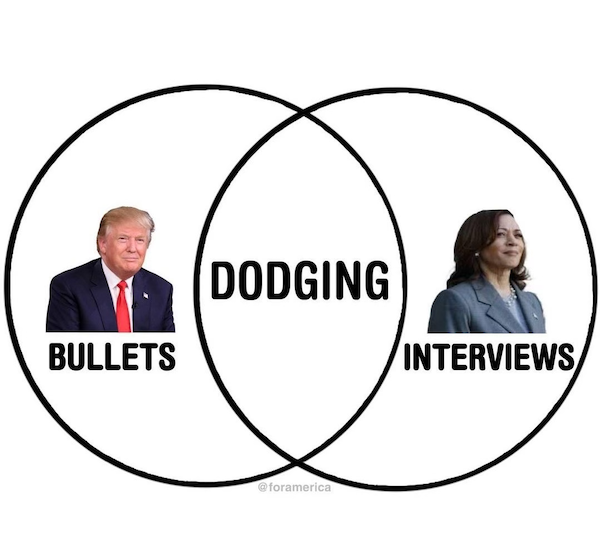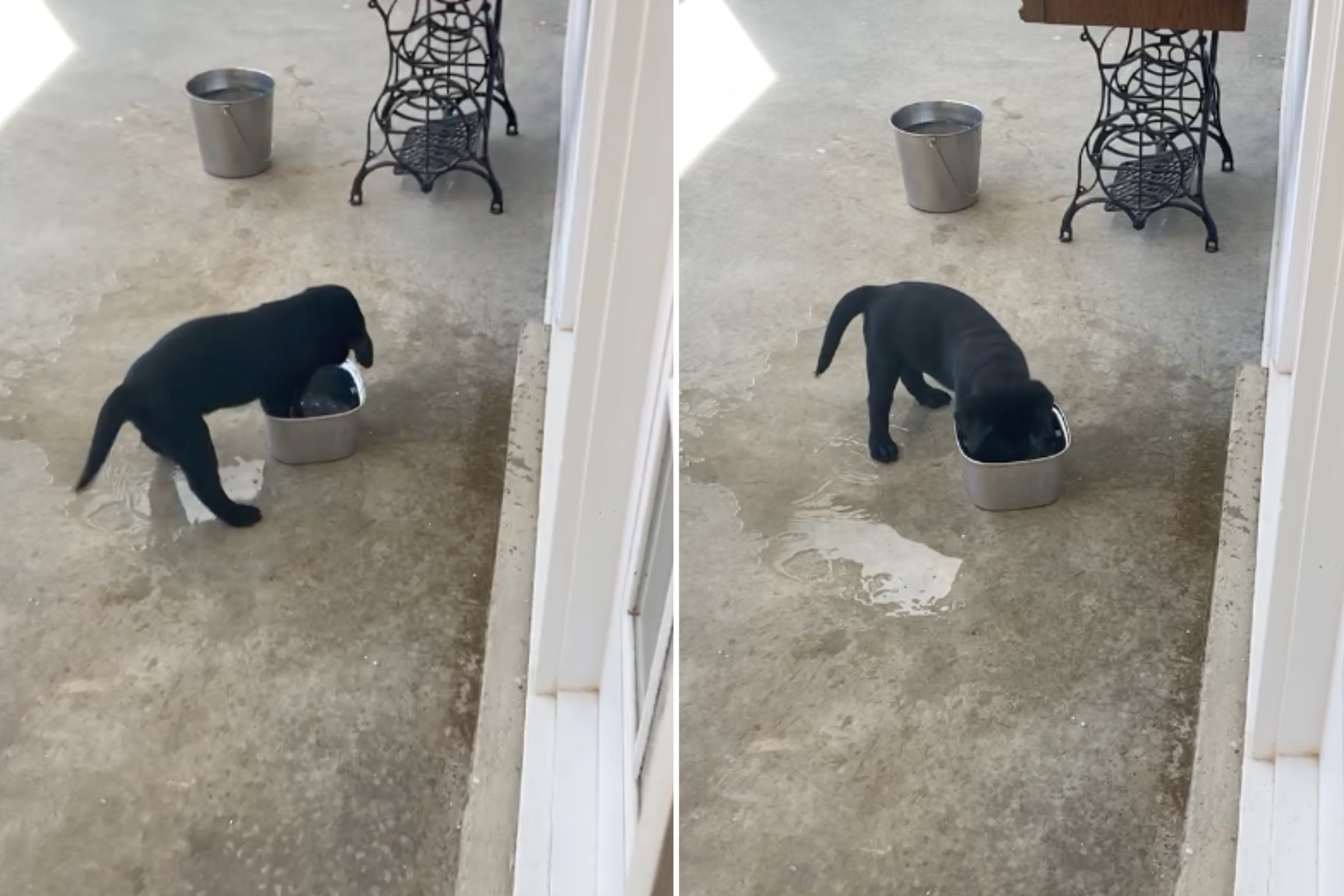[ad_1]
Yves here. What seems interesting is the signal Iran President Raisi is sending about his interest in increasing pressure on Israel in the Gaza conflict. Note that if your read the Helmer piece carefully, the Iranian readout seems to be about diplomatic pressure but also notes the failure of efforts to date to accomplish much.
In his interview on Friday at Judge Napolitano, Professor John Mearsheimer argued that Arab leaders (yes, Iran is Persian but what applies to Arab states should go double for Iran) are not keen about mixing things up in Israel, despite the very strong desire among the general public to do so. Scott Ritter has also said from early on and I have yet to hear him change his position, that Iran is not keen about getting into a war because it has endured a decade plus of sanctions and resulting economic constraints, is just starting to get past that and does not want to go back into hair-shirt mode.
However, Putin appears to have ducked the Iran query, despite beliefs there were private discussions about possible Iran actions through proxies. And note the idea that Erdogan talked up, but so far has come to naught, of a 1000 private boat flotilla to challenge the sea blockade and bring humanitarian aid, is still an option.
So is the signaling of an interest in Russian support in Gaza just designed to mess with Israeli heads? Or playing out a chess game further, that Iran expects that it will be made out to be the perpetrator in a false flag, and if the US is going to use that to justify some sort of aggression, it might as well be ready to strike fast and hard?
By John Helmer, the longest continuously serving foreign correspondent in Russia, and the only western journalist to direct his own bureau independent of single national or commercial ties. Helmer has also been a professor of political science, and an advisor to government heads in Greece, the United States, and Asia. He is the first and only member of a US presidential administration (Jimmy Carter) to establish himself in Russia. Originally published at Dances with Bears

An Iranian-Russian initiative on the Gaza War was tabled when Iranian President Sayyid Ebrahim Raisi met with President Vladimir Putin for several hours on Thursday. For the time being the Kremlin is doing its best to hide it.
According to Iran’s Foreign Minister Hossein Amir Abdollahian, speaking after Raisi had returned home, “a significant part of the negotiations focused on the Palestinian issue and Russia is thinking about an initiative on Gaza. The two sides stressed the need for an immediate cessation of the war and genocide in Gaza and the West Bank, he said, noting that the presidents of Iran and Russia also called for stopping the forced migration of Gazans and the immediate opening of the Rafah border to deliver massive humanitarian aid to Gazan people.”
There was a one-on-one session between Raisi and Putin at the commencement of the talks; a session of the two presidents with brief public statements; and then closed delegation presentations and a supper. Altogether, the talks lasted five hours. There were no press briefings at the conclusion.
There has been a blackout on the talks by Russian Defense Ministry, the military bloggers, and Moscow media like Vzglyad which has been taking a pro-Israel line. No Russian official will clarify what Abdollahian meant by his claim that “Russia is thinking about an initiative on Gaza” – except to point out that Abdollahian’s wording does not mean that the “initiative” at this stage was initiated by the Russian side.
Vedomosti reports that “Iran would like Russia to more actively express the pro-Palestinian position within the framework of public discourse, which would correspond to Iranian rhetoric. From the point of view of the North–South economy, of course, Tehran has a priority, it’s just that against the current background it, like any Muslim country, cannot demonstrate that it can have something more important than the situation in the Gaza Strip.”
According to the Kremlin communiqué, Raisi told Putin “the events unfolding in Gaza” are “surely genocide and a crime against humanity. It is lamentable that more than 6,000 children have been killed by the hands of the Zionist regime. Even sadder is the fact that all these crimes have been supported by the United States and Western countries. What is even more regrettable is that international organisations and the human rights organisations have lost their effectiveness… One of the issues that I would like to discuss with you, Mr Putin, is Palestine, as well as the challenges faced by the oppressed but strong Palestinian people. According to statistics, one child dies every ten minutes. Bombing must be stopped as soon as possible. This is not a regional issue, but a global issue, and a solution should be found promptly.”
Putin replied by changing the subject.
“Mr President, I will definitely take you up on your invitation [to visit Iran]. And I should note that we will keep working almost through the end of the year. We have scheduled the signing of an agreement on creating a free trade area between Iran and the Eurasian Economic Union in late December. It will create additional opportunities for expanding our interaction.”
The Kremlin has published the names of the Russian delegation accompanying Putin at the talks but refuses to disclose the names of their Iranian counterparts. “Wait for additional materials on our website”, the spokesman said.
Although Russian Defense Minister Sergei Shoigu was the second ranking member of the Russian side, Iranian sources confirm there was no military counterpart on their side.
Privately, Russian sources believe the two sides are discussing the protracted, long war strategy of Hamas and Hezbollah and the parallel engagement from Yemen and Iraq. They are also discussing ideas for breaking the Israeli blockade of Gaza with massive humanitarian aid in which the Arab states and China are also engaged in the planning.
“The war has to be economic and infrastructure suffocation [of Israel],” a Moscow source says. “Yes, that’s the only way to beat the beast.”
Raisi’s aircraft landed at Vnukovo at 1400 in the afternoon. The meetings with Putin began at the Kremlin at 1740. The first meeting between Raisi and Putin appears to have lasted less than 45 minutes — enough time to agree on the format for the detailed planning negotiations to follow, but too little time for negotiating a personal understanding on the Gaza war.
Putin had returned to Moscow early the same morning from his Wednesday’s talks in Abu Dhabi with President Mohammed bin Zayed Al Nahyan, and in Riyadh with Crown Prince Mohammed bin Salman (MBS). Planning for the talks with the Arab heads of state had been under way for more than a week, but were accelerated, Putin told Russian television, after there were “changes to plans.”
For what was tagged officially as a “working visit”, the imperial display turned on for Iran’s President by the Russian side was unusual. It was designed to match the palatial arrangements for Putin in the UAE and Saudi Arabia the day before.
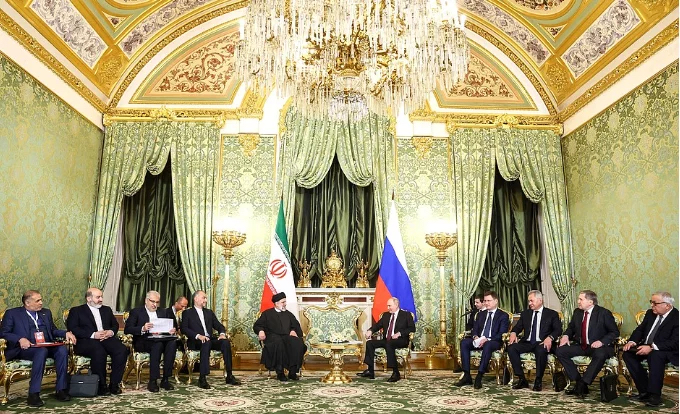
Following the personal meeting of the presidents, Putin and Raisi made public statements at this session of what the Kremlin has called the “narrow format”. The Kremlin communiqué names the Russian four on the right of the picture: right to left, Deputy Prime Minister and Co-Chairman of the Russian-Iranian Commission on Trade and Economic Cooperation Alexander Novak, a former Russian oil minister; Defense Minister Sergei Shoigu; presidential assistant for foreign affairs, Yury Ushakov; and Deputy Foreign Minister Sergei Vershinin. The Kremlin refuses to identify the four Iranian officials on the left. Iranian sources say they are, left to right: Iran’s Ambassador to Russia, Kazem Jalali; Mohammad Jamshidi, head of foreign affairs in the presidential office; Javad Owji , Oil Minister; and Hossein Amir Abdollahian, Foreign Minister.
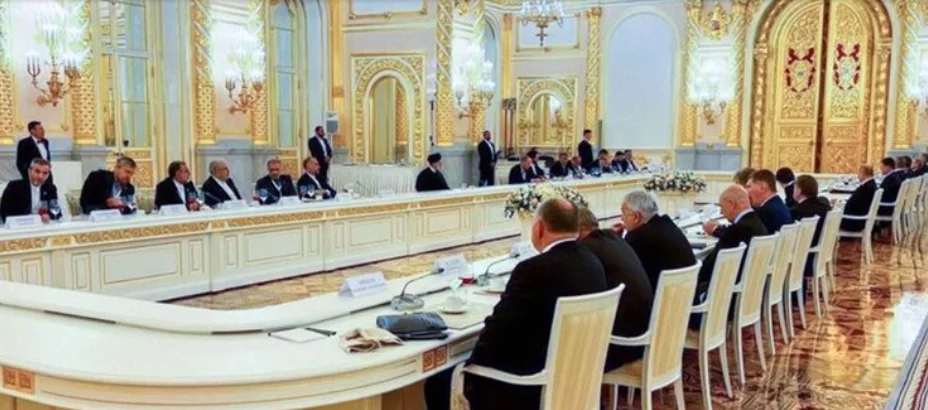
In the Iranian official news agency report, the third session of the talks involved expanded delegations. “The gathering was attended by Iranian Foreign Minister Hossein Amir Abdollahian, minister of roads and urban development [Mehrdad Bazrpash] oil minister [Javad Owji], head of the Atomic Energy Organization of Iran [Mohammad Eslami], the governor of the Central Bank of Iran [Mohammad-Reza Farzin], and their Russian counterparts. The two sides discussed a range of bilateral issues in the meeting, exchanged views on cooperation in the fields of energy, monetary and banking sector, transportation, and agriculture, and weighed plans for new initiatives to speed up the implementation of the past agreements.”
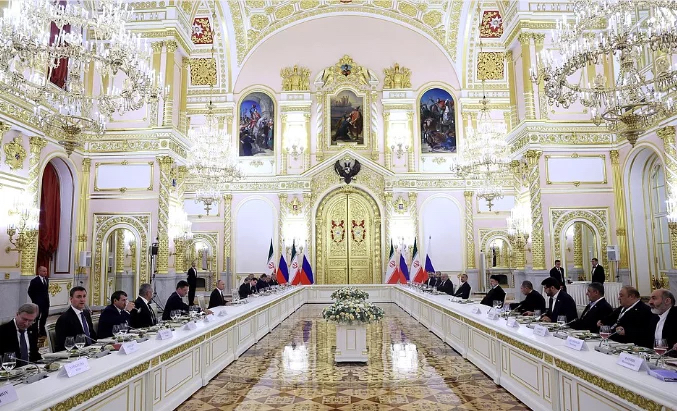
The third session was followed by a luncheon at the same table. There was no military discussion.
One outcome, if not intention, of this set-up, according to a Moscow source, was that it helped to isolate Putin as far as possible from Raisi, and prevent the two of them having intimate conversation. It’s unclear whether the one-on-one conversation with which they began, was resumed after the planned luncheon, which for timing turned out to be dinner at around 2100.
About two hours into the talks, the Islamic Republic News Agency (IRNA) published the first report and picture. This appears to shows the two presidents together in the Kremlin. In fact, the picture is from the Kremlin archive and dates from a meeting between the two presidents in Ashgabat, capital of Turkmenistan; that was on June 29, 2022. The IRNA text following the Kremlin private meeting is here.
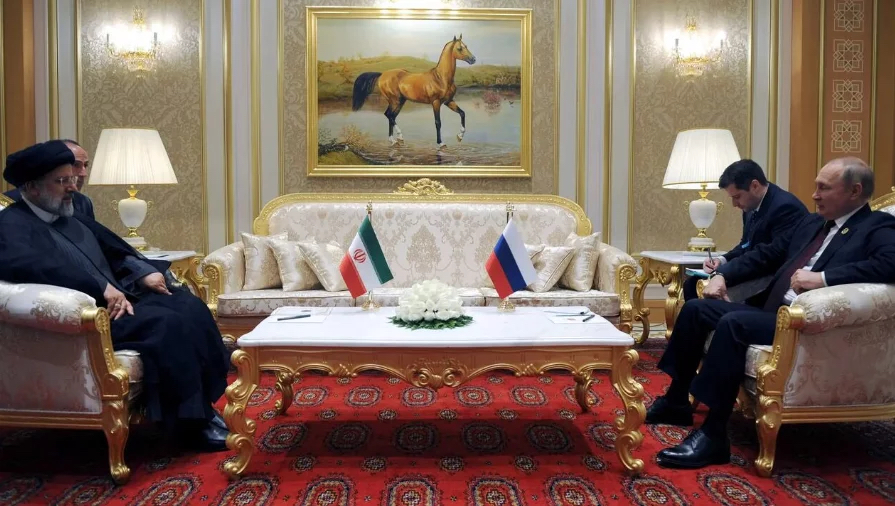
The primitive portrait of a young Arabian stallion on the wall and the new Bokhara pattern rug on the floor ought to be recognised as clues this is not a location in the Kremlin. Source: http://en.kremlin.ru/
In his public introduction, Putin told Raisi: “Yesterday, you know, I was in a neighbouring region, I flew over the territory of your country and I wanted to land and meet in Tehran, but they told me that the President had already packed up and was flying to Moscow.” Raisi replied, contradicting him: “I must tell you, Mr Putin, after your visit [to Saudi Arabia], I wish you godspeed, we were ready for your plane to land at Tehran Airport, and we were ready to welcome you as well.”
The strategic significance of the meeting sequence for the Russian, Emirati, Saudi, and Iranian leaders is great, and therefore secret. The London press is reporting that MBS of Saudi Arabia had delayed his London trip so that he could meet Putin — that had been decided several days before Putin’s arrival. Putin’s schedule on Wednesday had been grueling, and the meeting time was extended beyond schedule in Riyadh. The Russians also wanted to manage the public appearances to achieve parity between the Arabs and the Iranians.
The close-up video and audio record of the opening statements show Raisi in mental command, Putin hesitant, fidgeting, and fatigued.
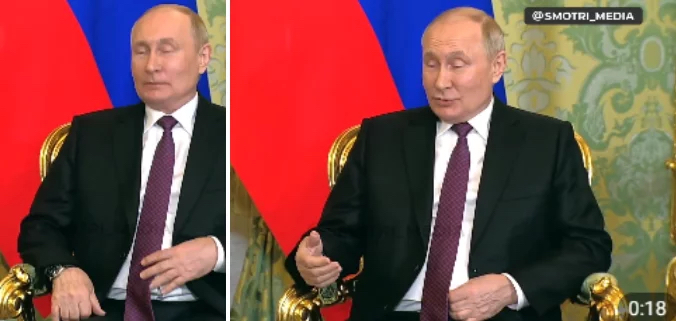
Source: https://t.me/s/rybar/ — 19:25 Moscow time
Putin’s repetitive right-hand motion on his chair arm, his persistent voice-clearing cough, and his resort to mnemonic formulas are indicators of his uncomfortableness following the private meeting with Raisi.

Source: https://twitter.com/
Notwithstanding, Moscow sources comment, there has been a noticeable improvement in the relationship between Putin and Raisi since Raisi was given the long-table treatment on his first visit to Moscow on January 19, 2022. The opening of the Special Military Operation in the Ukraine, NATO’s escalation on the battlefield, and the accelerating military collaboration between Iranian and Russian forces have transformed Putin’s conduct.
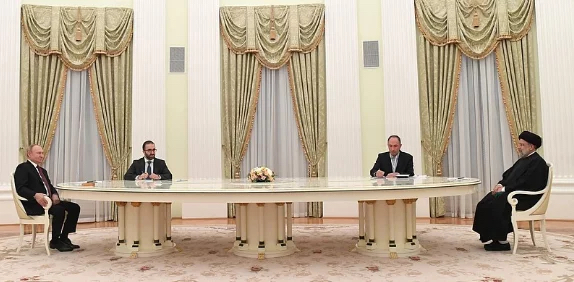
Source: http://en.kremlin.ru/
The Iranian positions were made clear ahead of Thursday’s trip to Moscow, and then immediately afterwards. Raisi’s priority, he said himself, was Gaza and breaking the Israeli blockade. “Holding talks on ways to send humanitarian aid to Palestine and help the Palestinians fulfill their legitimate rights will be among the plans during the Moscow visit, the president underlined.”
On Thursday morning, Teheran time, IRNA headlined Raisi’s objective was to get Putin to agree to a joint call for “immediate halt to Gaza bombardment”.
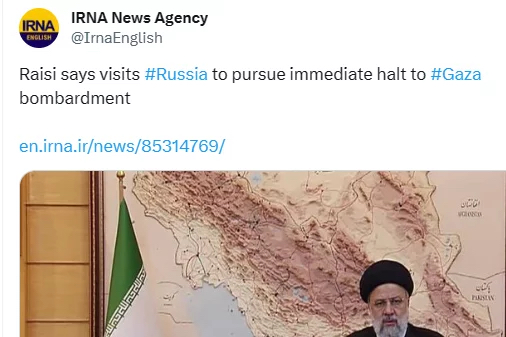
Source: https://twitter.com/
By the late evening, Raisi authorised his spokesman to issue a statement of agreement between the presidents which was significantly less. “In a 3 hour closed meeting btw Presidents Raisi & Putin, the two had a detailed and very useful negotiations on bilateral and regional issues, focusing on Gaza. Reminding successful cooperations in Levant, President Raisi proposed ideas. The two agreed to act in coordination.”
At Raisi’s right and head of delegation was the Iranian Foreign Minister Hossein Amir Abdollahian. Following the refusal of the Kremlin to identify the four, Iranian sources have revealed who they are. At the extreme left of the picture is Iran’s ambassador to Russia, Kazem Jalali. Second from left is Mohammad Jamshidi, a former professor of politics at the University of Teheran and currently deputy chief of the presidential staff for political affairs; he acts as the presidential spokesman. His comment on the talks is Raisi’s authorised version:

Source: https://twitter.com/MhmmdJamshidi
In the IRNA photograph of the Kremlin session, seated between Jamshidi and Abdollahian there was Javad Owji, Iran’s Oil Minister.
This lineup indicates there were Iranian matches for three of the Russian delegation, but not for Defense Minister Shoigu. Mohammad-Reza Gharaei Ashtiani, Brigadier General and Iran’s Defense Minister since 2021, is Shoigu’s counterpart, but he was not present in the Moscow meetings.
The Fars news agency has also announced that participating in the Iranian delegation, but not in the front row of the “narrow format” session, there were Minister of Roads and Urban Development Mehrdad Bazrpash; head of the Atomic Energy Organization of Iran, Mohammad Eslami; and the Governor of the Central Bank of Iran, Mohammad-Reza Farzin.

Left: Mohammad-Reza Ashtiani; centre, Mohammad-Reza Farzin; right, foreign ministers Abdollahian and Lavrov sign the “Declaration by the Russian Federation and the Islamic Republic of Iran on the Ways and Means to Counter, Mitigate and Redress the Adverse Impacts of Unilateral Coercive Measures” on December 5 in Moscow.
Farzin’s role, together with that of Russian Central Bank governor Elvira Nabiullina, is to devise counter-measures for US and European sanctions, and to implement “a road map [to] be drawn up by States to reduce the dependency of international trade on national currencies that are prone to being used to implement unilateral coercive measures or to sustain a particular State’s monetary hegemony over the global economy.” This is one of the sixteen points of agreement which Abdollahian signed with Russian Foreign Minister Sergei Lavrov on December 5, two days before Raisi’s arrival.
Read the full economic counter warfare plan here.
Moscow analysts note that while Putin may be keeping his distance from the Iranian rhetoric against Israel, at the working group level the collaboration of the two states in military, financial and strategic operations means much more. There is also discreet evidence that the Chinese are active in the planning of a major humanitarian operation for Gaza.
“On the battlefield Russians are very fast learners from their mistakes,” a veteran Moscow analyst says. “But in Russian politics and business they are slow to accept that the US and Israel have always been enemies to Russian interests, and will remain so. What the Americans and Israelis don’t realise is that Putin was the slowest to change his mind towards them. The Ukraine war and now the Gaza War have changed all that.”

[ad_2]
Source link





